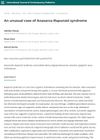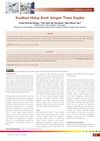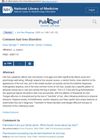 6 citations,
May 2017 in “InTech eBooks”
6 citations,
May 2017 in “InTech eBooks” Hair loss can cause serious mental health problems and treating it requires a team of experts.
[object Object]  7 citations,
July 2019 in “International archives of internal medicine”
7 citations,
July 2019 in “International archives of internal medicine” Common skin conditions can greatly affect a person's mental health and social life.
 1 citations,
March 2012 in “Indian Journal of Rheumatology”
1 citations,
March 2012 in “Indian Journal of Rheumatology” Most lupus patients in the study experienced hair loss, which greatly affected their mental and social well-being.
 3 citations,
October 2021 in “Brain Sciences”
3 citations,
October 2021 in “Brain Sciences” Long-term use of Risperidone may be linked to a serious skin condition in bipolar patients, affecting their overall well-being.
 April 2024 in “The Egyptian Journal of Hospital Medicine ”
April 2024 in “The Egyptian Journal of Hospital Medicine ” Current treatments for androgenetic alopecia manage symptoms but don't cure it, and it affects social and psychological well-being.
 30 citations,
September 2020 in “Journal of Patient-Reported Outcomes”
30 citations,
September 2020 in “Journal of Patient-Reported Outcomes” Alopecia Areata (AA) causes significant emotional distress, including feelings of embarrassment, depression, and anxiety, and impacts social interactions and daily activities.
 74 citations,
January 1998 in “Dermatology”
74 citations,
January 1998 in “Dermatology” Men who think they are losing hair feel worse about themselves, especially if they are younger.
15 citations,
July 2021 in “JAMA Dermatology” Androgenetic alopecia negatively affects quality of life and self-esteem, especially in women, but not depression.
 4 citations,
November 2022 in “Frontiers in Medicine”
4 citations,
November 2022 in “Frontiers in Medicine” People with alopecia areata are more likely to have anxiety and depression and a lower quality of life.
 September 2024 in “International Journal of Contemporary Pediatrics”
September 2024 in “International Journal of Contemporary Pediatrics” A multidisciplinary approach is crucial for treating complex cases of Rapunzel syndrome in children.
 March 2024 in “World Journal Of Advanced Research and Reviews”
March 2024 in “World Journal Of Advanced Research and Reviews” Educators who survived COVID-19 faced physical, psychological, and social challenges but overcame them with resilience and support, highlighting the need for schools to provide better health and psychological care.
 24 citations,
August 2005 in “Health and Quality of Life Outcomes”
24 citations,
August 2005 in “Health and Quality of Life Outcomes” Women with androgenetic alopecia experience worse physical well-being and quality of life, but similar mental health compared to those without it.
 7 citations,
May 2017 in “Journal of The American Academy of Dermatology”
7 citations,
May 2017 in “Journal of The American Academy of Dermatology” Camouflaging agents like hair fibers and wigs significantly improve appearance and self-esteem for most hair loss patients.
 48 citations,
July 2009 in “The Journal of Sexual Medicine”
48 citations,
July 2009 in “The Journal of Sexual Medicine” DHEA did not improve sexual function, well-being, or menopausal symptoms in postmenopausal women with low libido but caused side effects like acne and increased facial hair.
 10 citations,
April 2006 in “Seminars in Reproductive Medicine”
10 citations,
April 2006 in “Seminars in Reproductive Medicine” Testosterone therapy may improve mood, well-being, and sexual function in premenopausal women, but more research is needed on its long-term safety and effectiveness.
 January 2024 in “International journal of yogic, human movement and sports sciences”
January 2024 in “International journal of yogic, human movement and sports sciences” Yoga Nidra improves well-being and reduces anxiety in women with PCOS.
 21 citations,
January 1988 in “Stress Medicine”
21 citations,
January 1988 in “Stress Medicine” Stress affects skin health and emotional well-being should be considered in skin disease treatment.
 159 citations,
September 2001 in “European Journal of Cancer Care”
159 citations,
September 2001 in “European Journal of Cancer Care” Chemotherapy-induced hair loss significantly affects patients' well-being, and nurses are key in helping them cope, but more research is needed to find effective treatments.

Hair loss can cause significant social and emotional issues, especially for women and young men.
 3 citations,
January 2012 in “Wageningen Academic Publishers eBooks”
3 citations,
January 2012 in “Wageningen Academic Publishers eBooks” Hair health depends on various factors and hair loss can significantly affect a person's well-being; understanding hair biology is key for creating effective hair care treatments.
 51 citations,
January 2012 in “Annals of Dermatology”
51 citations,
January 2012 in “Annals of Dermatology” Asian hair loss differs from Europeans; consider individual needs and psychological well-being for treatment.
 November 2023 in “Cermin Dunia Kedokteran”
November 2023 in “Cermin Dunia Kedokteran” Tinea capitis can affect mental health, but treatment improves both health and well-being.
[object Object]  42 citations,
September 2018 in “Journal der Deutschen Dermatologischen Gesellschaft”
42 citations,
September 2018 in “Journal der Deutschen Dermatologischen Gesellschaft” Adult female acne requires a comprehensive treatment approach, including medical options and lifestyle changes, with attention to psychological well-being.
 6 citations,
November 2007 in “Archives of Disease in Childhood: Education & Practice”
6 citations,
November 2007 in “Archives of Disease in Childhood: Education & Practice” The document concludes that accurate diagnosis of alopecia in children relies on thorough examination and history, and while treatments exist, none can alter the course of alopecia areata, which can significantly affect a child's psychological well-being.
 3 citations,
January 2018 in “İstanbul Kuzey Klinikleri”
3 citations,
January 2018 in “İstanbul Kuzey Klinikleri” Hair loss was found in 37.4% of surveyed rural high-school students in Eskisehir, Turkey, affecting their quality of life, especially in general health and mental well-being.
 2 citations,
January 2023 in “Research Square (Research Square)”
2 citations,
January 2023 in “Research Square (Research Square)” Managing emotional distress, obesity, insulin resistance, and high male hormones is crucial for improving well-being in women with PCOS.
 May 2019 in “Paediatrics and child health”
May 2019 in “Paediatrics and child health” The document concludes that personalized treatment, including lifestyle changes and medication, is essential for managing PCOS in teenagers, while also addressing their psychological well-being.
1 citations,
November 2023 in “Medicina” Hormone therapy improves mental well-being in transgender individuals but requires ongoing health monitoring.
 29 citations,
July 2003 in “PubMed”
29 citations,
July 2003 in “PubMed” Hair loss affects both genders and can impact well-being, with treatments available for various types.
54 citations,
April 2011 in “Journal of Multidisciplinary Healthcare” SLE patients often face depression and anxiety due to physical changes, with African-American and Hispanic patients having higher unmet psychological needs.



























